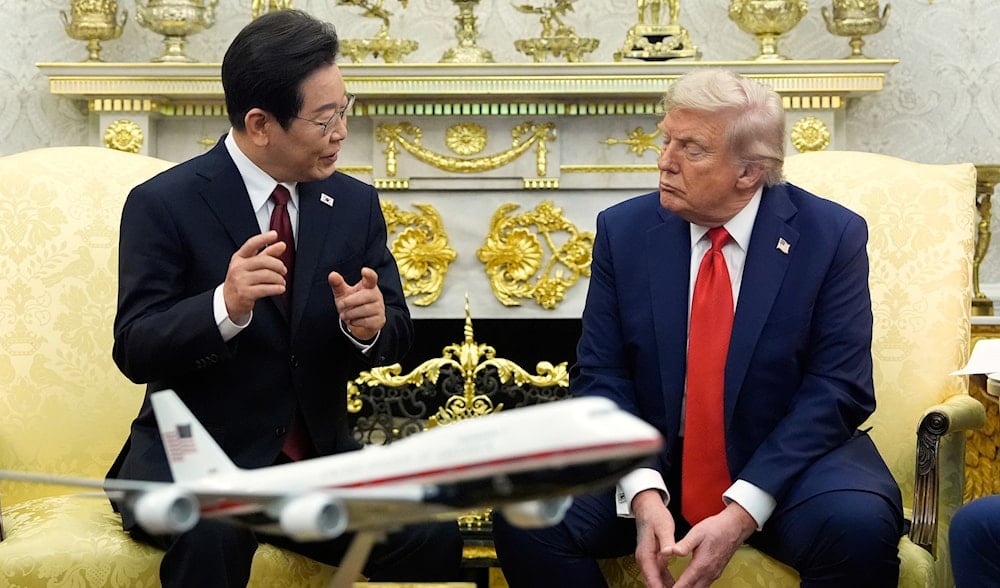South Korea defies US push for Japan-like trade agreement
South Korea's market size and foreign currency reserves do not permit it to accept a trade deal like that of Japan
-

South Korean President Lee Jae Myung speaks as US President Donald Trump listens during a meeting in the Oval Office of the White House, Monday, Aug 25, 2025, in Washington. (AP Photo/Alex Brandon)
Trade negotiations between South Korea and the United States have hit a roadblock, as Seoul pushes back against pressure from Washington to finalize a deal resembling the recent Japan-US trade arrangement.
South Korea's Trade Minister, Yeo Han-koo, is in Washington to meet with US Trade Representative Jamieson Greer, as both sides attempt to iron out the specifics of a previously announced $350 billion South Korean investment in the US.
"The devil is in the details. We are in tense negotiations over the details," Yeo stated upon his arrival in Washington.
The South Korean government has raised concerns over demands that would allow US President Donald Trump to determine where these substantial investments should be directed. Sources familiar with the negotiations indicated that Seoul is hesitant to adopt the same approach as Tokyo, which permitted a similar level of control in its $550 billion trade deal with Washington.
Tariff disparity, trade frictions
The original framework of the deal, revealed in July, proposed that in return for reducing threatened tariffs on Korean exports from 25% to 15%, South Korea would commit to major investments in the US.
Trump celebrated the deal on social media, claiming that South Korea would "give to the United States $350 Billion Dollars for Investments owned and controlled by the United States, and selected by myself, as President."
However, South Korean President Lee Jae Myung has dismissed what he described as irrational and unfair demands. "We will not conduct negotiations that are not rational or fair," Lee said. "On the surface, the ongoing talks appear rough, aggressive, excessive, irrational and nonsensical, but the final conclusion will end up being rational."
Lee's policy chief, Kim Yong-beom, clarified that much of the pledged amount would come in the form of loans and guarantees from state-owned financial institutions, and would also account for existing investments by Korean companies in the US.
Currency reserves, market volatility
US pressure intensified following Japan's agreement, which included $550 billion in funding for various US projects. As a result, Japanese exports now face a reduced 15% tariff, placing South Korean manufacturers, particularly in the auto sector, at a disadvantage.
"The Japanese signed the contract," US Commerce Secretary Howard Lutnick told CNBC. "The Koreans either accept the deal or pay the tariffs. Black and white. Pay the tariffs or accept the deal."
Yet, South Korean officials argue that replicating Japan’s terms is not feasible. The country’s foreign currency reserves are significantly smaller, and there is no active currency swap agreement with the US.
In an interview with the Financial Times, Jennifer Lee, managing director at the Asia Group consultancy, pointed out that the South Korean won is "significantly more volatile compared to the Japanese yen," which could pose risks to financial stability if a similar investment structure is pursued.
Uncertainty around Korean investment commitments
Although the proposed $350 billion package includes $100 billion in US energy purchases and $150 billion toward a joint shipbuilding program branded "Make America Shipbuilding Great Again" (MASGA), Korean industry insiders say the numbers remain vague.
"There is no breakdown of Korea’s investment figure for the US, and no one knows who is investing how much," Choi Byung-il, a former trade negotiator and professor emeritus at Ewha Womans University in Seoul told the Financial Times.
Seoul has indicated that the financial support will primarily come in the form of loans and debt guarantees for Korean investment projects in the US, but clarity on specifics is lacking.
ICE raid fallout
Relations have also been strained by a recent immigration raid in Georgia, where hundreds of Korean workers were detained at a Hyundai plant. The incident has reportedly affected the atmosphere of the negotiations.
"Korean companies have watched with dismay as their workers were hauled away by immigration agents, creating a chill with regard to now being asked to commit to new investments," noted Wendy Cutler, a former US trade negotiator now with the Asia Society, to the Financial Times.
However, a representative from a major Korean industry group told the Financial Times that while the immigration issue might justify calls for bilateral cooperation on technical visas and related matters, it is unlikely to influence the overall structure of the trade deal.

 4 Min Read
4 Min Read








